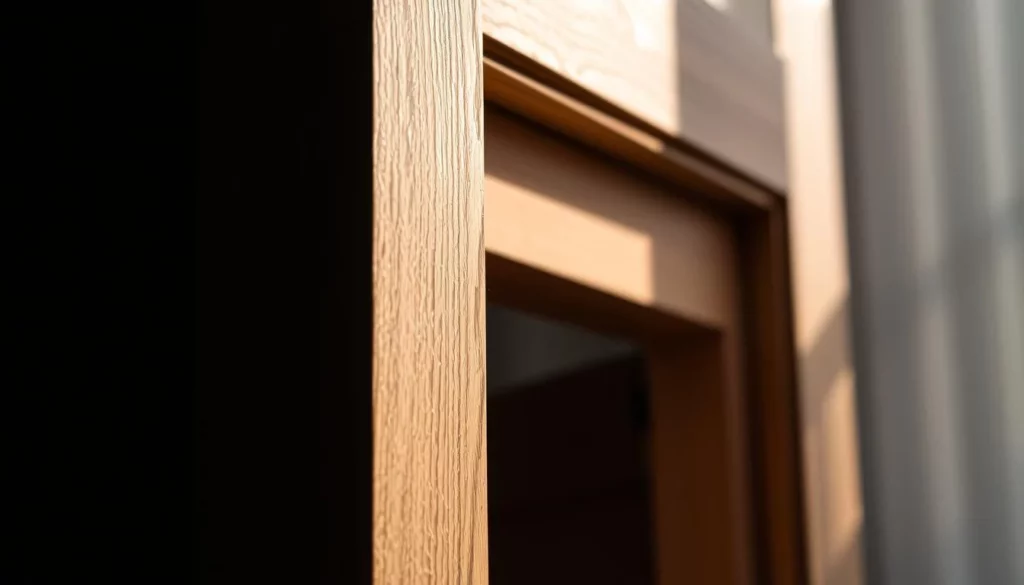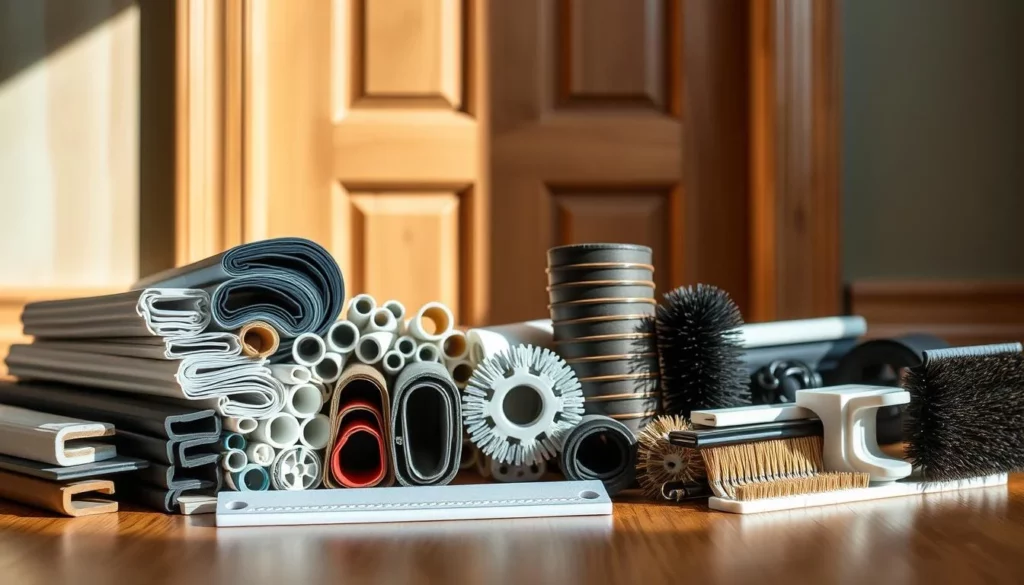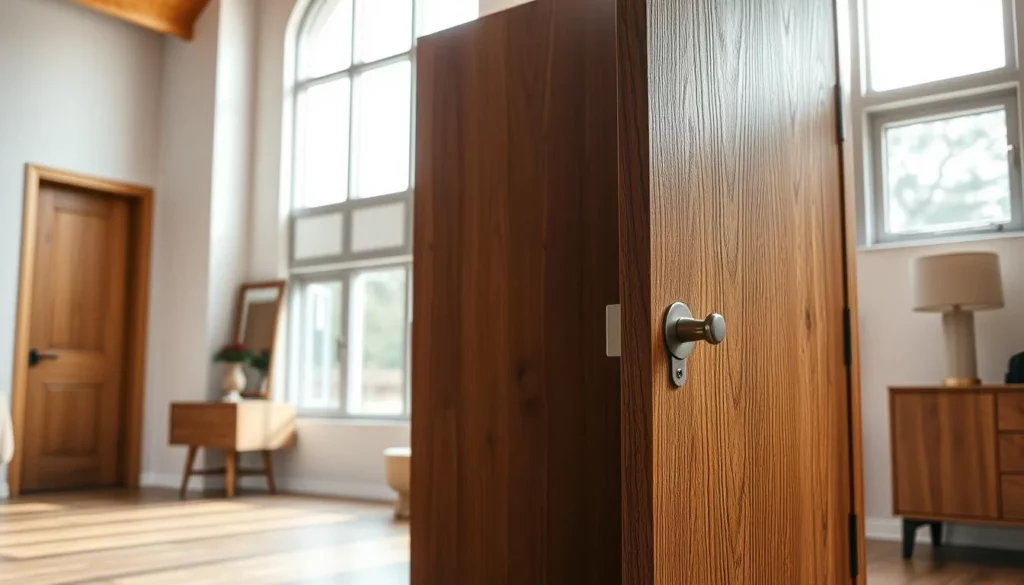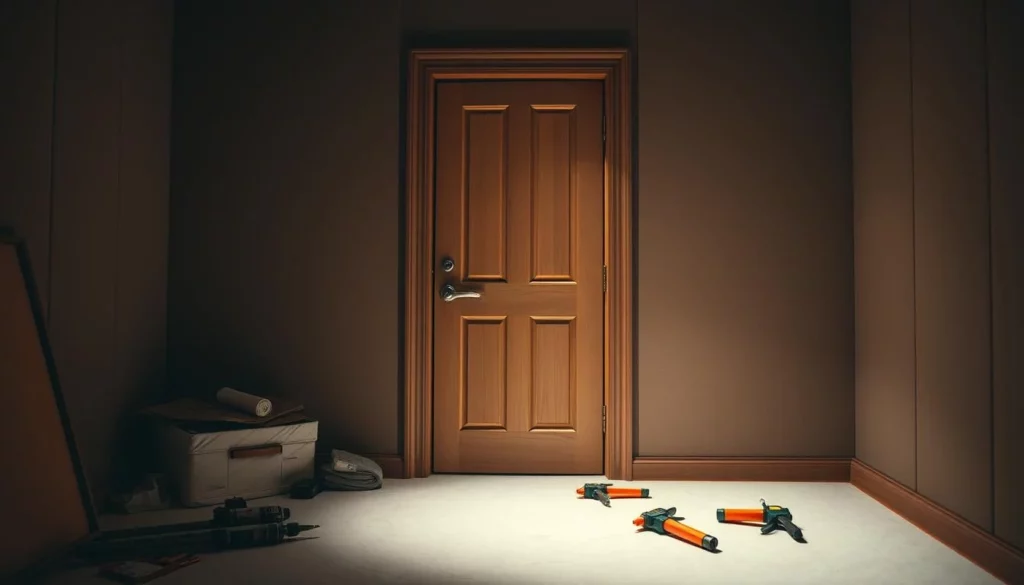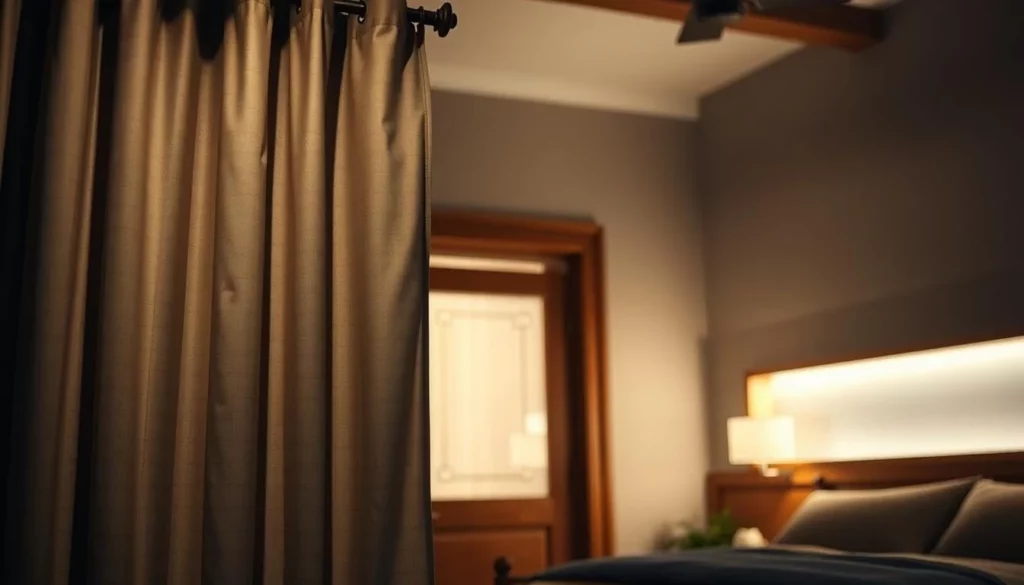You’ve probably noticed that sound can easily travel through doors. This makes it hard to keep a quiet space. Experts say doors are the main cause of sound leakage. Fixing this is key for good noise control.
To cut down on noise, soundproofing door frames is crucial. Sealing gaps with door seals and sweeps helps a lot. Adding mass with acoustic panels also works well. These steps can greatly reduce noise.
By understanding how door frames affect sound and using the right soundproofing, you can make your space quieter and more comfortable.
Understanding Sound Leakage in Homes
Sound leakage is key to a cozy and private home. It happens when sound moves from one area to another, often through gaps in your home’s structure.
What is Sound Leakage?
Sound leakage happens when sound waves get out or in through gaps. This can make your home less private and disturb you with outside noises. Effective soundproofing solutions for doors help keep sound in.
Common Causes of Sound Leakage
Many things cause sound leakage in homes. Some common ones are:
- Gaps and cracks around door frames
- Inadequate or worn-out sealing around doors and windows
- Poorly constructed or old door frames that don’t fit right
Fixing these problems is crucial for better sound insulation for doors and less noise at home. Door seals and weatherstripping can greatly reduce sound leakage by filling gaps and improving door seals.
Knowing why sound leakage happens and fixing it can greatly improve your home’s sound comfort and privacy. The impact of door frames on noise control is very important. Choosing the right door frame can make a big difference.
The Role of Door Frames in Sound Insulation
Door frames are key to keeping your home quiet. They help block outside noise. The type and how well they’re installed matter a lot.
How Door Frame Materials Affect Sound
The material of your door frame affects sound insulation. Solid wood frames block sound better than hollow ones. Metal frames can also be good, depending on how they’re made and sealed.
Comparison of Door Frame Materials
| Material | Sound Insulation Effectiveness | Durability |
|---|---|---|
| Solid Wood | High | Medium |
| Metal | High | High |
| Hollow Wood | Low | Low |
| Composite | Medium | High |
The Importance of Proper Sealing
Sealing your door frame is vital for sound insulation. Gaps can let sound through. Weatherstripping and a tight seal help keep sound out.
Choosing the right door frame and sealing it well boosts your home’s sound quality. Acoustic door frames are designed to keep sound in and out, improving your home’s sound.
Types of Door Frames and Their Soundproofing Qualities
The type of door frame you pick is key to soundproofing your home. Different materials and designs block sound differently. This affects how quiet and comfortable your home is.
Wooden Door Frames
Wooden door frames are loved for their look and natural sound blocking. Solid wood doors block sound well because they are dense. But, if the wood isn’t sealed or if there are gaps, sound can get through.
To make wooden door frames better at blocking sound, add weatherstripping or a door sweep. These small steps can make a big difference in keeping sound out.
Metal Door Frames
Metal door frames are common in offices but can work well at home too. But, metal can make sound bounce back, creating echoes. It’s important to seal metal frames well and use solid, not hollow, doors.
Adding sound insulation for doors materials to metal frames can help. You can put insulation in the frame or use sound-absorbing materials around the door.
Composite Door Frames
Composite door frames mix materials like wood, metal, and insulation. They look good and are durable, with good insulation. This makes them a good choice for soundproofing.
The soundproofing of composite frames depends on how they’re made. Choose frames made for sound insulation. Also, seal gaps and use door sweeps for extra sound blocking.
In short, the door frame you pick greatly affects your home’s soundproofing. Knowing about different materials and using soundproofing tricks can make your home quieter and more comfortable.
The Impact of Door Frame Design on Acoustics
The design of your door frame can greatly affect your home’s sound quality. How a door frame is made and designed can change how sound moves around your home.
Door frames are more than just pretty; they’re key to soundproofing. The materials and designs used can either soak up sound or let it pass through. This can change how your home sounds.
Traditional vs. Modern Door Frame Styles
Older door frames often have classic looks but might not block sound well. Newer door frames, on the other hand, use materials and designs that help with sound.
Modern door frames include features like acoustic seals and solid cores. These can really cut down on sound getting out.
Acoustic Considerations in Design
When you’re picking or updating door frames, think about how they’ll affect sound. Using sound-absorbing materials and making sure the door fits tightly can make your home sound better.
- Seal gaps and cracks around the door frame to prevent sound leakage.
- Use soundproofing materials in the door frame construction.
- Consider the type of door and its material for optimal sound absorption.
By paying attention to these sound-related details, you can make your home sound better. And you’ll also cut down on outside noise.
Techniques for Reducing Sound Leakage Through Door Frames
To cut down sound leakage through door frames, you need a few key methods. These techniques can make your home quieter and more private. They help create a more comfortable living space.
Sealant Usage
Sealants are a top choice for blocking sound. Sealants fill gaps between the door frame and walls. This stops sound from getting in or out. Pick a sealant made for soundproofing, as they work best.
Weather Stripping Applications
Weather stripping seals gaps between the door and its frame. It helps keep sound out and improves insulation. You can pick from foam tape, felt, or vinyl, depending on your door.
Adding Door Sweeps
A door sweep is a rubber or vinyl piece at the door’s bottom. It seals the gap at the threshold. Door sweeps block sound, drafts, and moisture. They’re simple to put in and a great DIY fix.
Using sealants, weather stripping, and door sweeps together can greatly reduce sound leakage. This makes your home quieter and more private.
The Benefits of Soundproof Door Frames
Soundproof door frames do more than just block out noise. They make your home a better place to live. They help keep sound inside, making your home sound better.
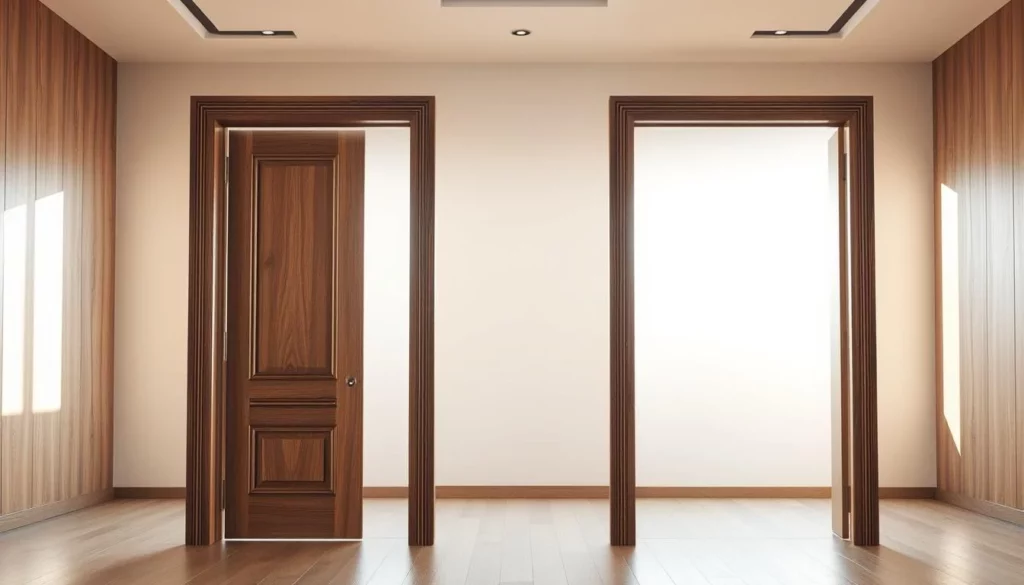
These door frames also improve your privacy and comfort. They seal gaps and block sound, making your space quieter and more private. This is great for homes with many people or lots of outside noise. For more tips on soundproofing, check out soundproofing a door.
Enhanced Privacy and Comfort
Soundproof door frames keep your home quiet and peaceful. They block sound, keeping your personal areas private and calm. This is very important in places like bedrooms, home offices, or media rooms.
Key benefits include:
- Reduced noise disturbance
- Increased privacy
- Improved overall comfort
Improved Home Value
Soundproof door frames also boost your home’s value. People want homes that are quiet and comfortable. Adding these door frames makes your home more attractive, which can be a big plus in noisy cities or near highways.
Improving sound quality with door frame upgrades is a smart move for homeowners. Sound insulation for doors is key to better sound in a room.
DIY vs. Professional Solutions for Soundproofing
When you want a quieter home, you might wonder if DIY or professional help is better. It’s key to know the differences between DIY and professional soundproofing.
When to Consider DIY Methods
DIY soundproofing can save money and be fun, for small sound problems. It’s good for fixing small gaps around doors or windows. Using sealants or weatherstripping can help block noise. DIY is great if you’re on a tight budget or like doing things yourself. But, make sure you can handle the task before starting.
Some DIY soundproofing tips include:
- Adding mass to walls and ceilings
- Sealing gaps and cracks around doors and windows
- Using acoustic panels
These methods work well for small sound issues. But, they might not solve bigger noise problems.
Benefits of Hiring a Professional
For big soundproofing jobs, getting a pro is usually the smart choice. Pros have the skills and tools for tough soundproofing tasks. They offer a custom solution, top-notch materials, and a workmanship guarantee. They also know the best soundproofing strategies for your home.
When choosing between DIY and a pro, think about these points:
- The size of the soundproofing job
- Your budget for the project
- The complexity of the task
By considering these, you can pick the best option for your needs. This ensures your doors and home are well soundproofed.
Evaluating Existing Door Frames for Soundproofing
Checking your door frames is the first step to better soundproofing at home. You need to spot signs of poor sound insulation and check their condition.
Signs of Ineffective Sound Insulation
If you can hear sounds from outside or other rooms easily, your door frames might not be soundproofing well. Look out for:
- Gaps or cracks around the door frame
- Visible light coming through the edges of the door
- Deteriorated or worn-out weatherstripping
These signs mean your door frames might not be doing their job. Effective sound insulation is key for privacy and comfort at home.
How to Assess Door Frame Condition
Start by looking for gaps or cracks in your door frames. Check the seals and weatherstripping for wear. Try closing the door and listen for sound leaks.
A thorough assessment will show you what needs fixing. Think about the material of your door frames too. Solid wood frames are usually better at soundproofing than hollow ones.
After finding the problems, you can fix them. Seal gaps, replace weatherstripping, or get new door frames. These steps will make your home quieter and more private.
Stopping sound leaks is more than just fixing door frames. It’s about keeping your home peaceful. By improving your door frames, you’re taking a big step towards better soundproofing.
Additional Considerations for Sound Control
To get the best sound control, you need to think about more than just door frames. Walls and windows around your door frames also play a big role. They can greatly affect how well your home sounds.
Influence of Surrounding Walls
The walls around your door frames can either help or hurt your soundproofing. For example, walls with cavities or made of less dense materials might not block sound as well as solid or thicker walls.
- Dense Materials: Using dense materials for your walls can improve soundproofing.
- Proper Insulation: Ensuring that your walls are well-insulated can significantly reduce sound leakage.
- Sealing Gaps: Any gaps or cracks in the walls should be sealed to prevent sound from escaping or entering.
Impact of Windows on Overall Soundproofing
Windows are also key to your home’s soundproofing. The type and condition of your windows can greatly affect how much sound is let in or out.
- Consider upgrading to double or triple-glazed windows for better sound insulation.
- Ensure that windows are properly sealed around the edges to prevent sound leakage.
- Using acoustic window panels can provide an additional layer of soundproofing.
By tackling these extra factors and using noise reduction techniques, you can greatly enhance your home’s sound quality. It’s all about making a detailed soundproofing plan. This plan should cover door frames, walls, and windows.
Maintaining Soundproofing Features Over Time
Keeping your home soundproofed means regular checks and upkeep. It’s not just a one-time job. Over time, wear and tear can weaken your soundproofing, causing sound to leak.
Regular Checks and Maintenance are key to keeping soundproofing effective. Look for damage or wear on door frames. Make sure there are no gaps or cracks around doors and that seals are tight. Also, check that door sweeps and weatherstripping are in good shape. These help a lot in preventing sound leakage through doors.
Regular Checks
It’s important to regularly check your door frames and parts. Look for signs of wear, like cracks in sealant or damage to the frame. Also, check the door sweep and weatherstripping. Worn-out parts can hurt sound insulation.
- Inspect door frames for damage or gaps.
- Check the condition of sealants and weatherstripping.
- Verify that door sweeps are intact and functioning.
Upgrading Door Frames When Necessary
Sometimes, you might need to upgrade your door frames. This could be due to wear and tear or a drop in soundproofing. Switching to acoustic door frames can greatly improve your home’s soundproofing. Look for materials and designs known for sound insulation, like solid core or soundproof doors.
When upgrading, pick the right door frame for your needs. The material and build of the frame affect soundproofing. Also, talking to a professional can help find the best solution for your home.
By keeping up with soundproofing and upgrading when needed, your home stays quiet and private. Regular maintenance and timely upgrades are investments in your home’s comfort and value. They help create a more peaceful living space.
Conclusion: Optimizing Your Home’s Sound Environment
Improving your home’s sound environment starts with door frames. They play a big role in keeping sound in or out. By understanding this, you can make your home sound better.
Key Takeaways
Good soundproofing for doors means choosing the right materials and sealing them well. Upgrading your door frames can make your home more private, comfortable, and valuable.
For more tips on soundproofing, like soundproofing walls, check out Soundproof Spaces. They have more resources to help you.
Actionable Steps
To better sound with door upgrades, first check your door frames. Look for where sound leaks in. Then, use sealants and weather stripping to fix it. These steps will help make your home quieter and more peaceful.
